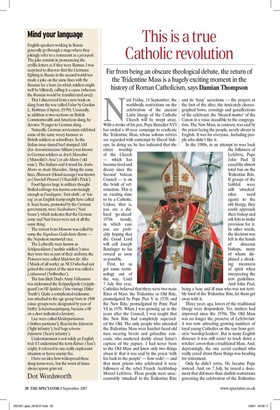Mind your language
English-speakers working in Russia generally go through a stage where they jokingly refer to a restaurant as a pectopah. The joke consists in pronouncing the cyrillic letters as if they were Roman. I was surprised to discover that the Germans fighting in Russia in the second world war made a joke on the same lines with the Russian for a barn (in which soldiers might well be billeted), calling it a capau (whereas the Russian would be transliterated saraj).
This I discovered from a new book on slang from the war called Fubar by Gordon L. Rottman (Osprey, £9.99). Unusually, in addition to two sections on British Commonwealth and American slang, he devotes 70 pages to German slang.
Naturally, German servicemen exhibited some of the same weary humour as British soldiers or schoolboys. So the Italian-issue tinned beef stamped AM (for Amministrazione Militare) was known to German soldiers asArsch Mussolini (Mussolini's Arse') or alte Mann (old man'). The Italians said it stood for Arabo Morto or Anale Mussolini. Along the same lines, Blutwurst (blood-sausage) was known as Churchill-Pimmel (Churchill's Prick).
Food figures large in military thought. Boiled cabbage was known convincingly enough as Fusslappen, Toot-cloth', or 'toerag' as an English tramp might have called it. Soya beans, promoted by the German government, were Nazibohnen (Nazi beans'), which indicates that the German army and Nazi forces were not at all the same thing.
The retreat from Moscow was called by some the Napoleon-Geditchtnis-Renne — the Napoleon memorial race.
The Luftwaffe were known as Schlipssoldaten (necktie soldiers') since they wore ties as part of their uniform; the Pioneers were called Madchen fur Alles (Maids of all work); an NCO who had not gained the respect of the men was called a Leithammel (bellwether).
The last-ditch Dad's Army Vaksstumi was nicknamed the Kriippelgarde (crippleguard') or ILI-Spittlese (late-vintage Hitler Youth'). Quite a complicated nickname was attached to the age group born in 1900 (since groups were designated by year of birth): Scheisshausjahrgang, because a 00 on a door indicated a lavatory.
Lice were called Meideipariisanen (clothes-partisans); fleas leichte Infanterie (light infantry); bed bugs schwere Infanterie (heavy infantry).
Understatement is not solely an English trait if I understand the term Rabatz (fuss') aright; it referred to any really unpleasant situation or heavy enemy fire.
I have no idea how widespread these slang terms were, but the worst of times always spawn grim wit.
Dot Wordsworth



































































 Previous page
Previous page